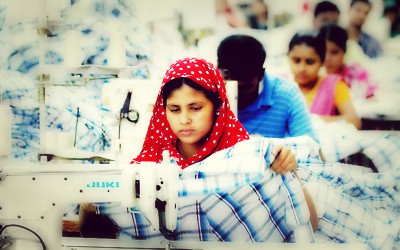
Image credit: Reuters
In an article written last month, my colleague broached the issue of the conditions in clothing factories in developing countries like Bangladesh and Vietnam. [1] While we agree that many factories operate in conditions that no American would accept, there are some major points of disagreement that I want to tackle in this piece.
Let’s start in your room: look in your closet and look at the tags on your clothes. Most of them say “made in Bangladesh”, “China”, “Vietnam” or elsewhere. In fact, as Anthony noted in his article, 98% of American clothes are imported [2] with China, Vietnam, and Bangladesh accounting for 37.1, 10.4, and 6.2 percent of US clothing imports respectively (in 2014). [3] Now before I get into where I disagree with my colleague, I should note that yes, the conditions in many factories are deplorable, buildings may not be up to American standards in construction and maintenance, the workers are paid much lower than an American worker would be, they work longer hours, and in many cases even as children. You may be inclined to think that because of those conditions and wages, workers in Asian factories are “practically slave laborers” [1], which brings us to the other side of last month’s political vendetta: ethical labor practices vs. convenience and consumer choice.
While the debate over ethical labor practices and convenience/choice can be applied to labor issues in any country, there is a further vendetta underlying this notion that needs to be addressed: Western Populism v. International Development. Namely, in an increasingly interconnected world, should American populist demands be allowed to impede the economic development of the poorest countries?
The debates regarding the outsourcing of jobs tend to tug at the heartstrings like the movement of manufacturing from the Midwest, and are set off in mainstream discourse by major tragic events like 2013’s Rana Plaza collapse. However, while many well-intentioned American liberals and other populists rail against companies sending jobs overseas, often unanswered is the question of what are the poor in those countries to do for a living otherwise? Sure, it’s not the job of an American politician to worry about the residents of a foreign country when it comes to domestic policy concerns, but what about the progressives? Progressives generally support the rights of workers to self-determination and providing aid to countries in order to develop economically, yet at the same time they want to take what is often the only option for uneducated adults in the developing world for employment outside of subsistence agriculture. In making his argument, Anthony makes three key points:
- Outsourcing is a huge problem in the garment industry (see the massive shift from 1960-2013)
- Foreign sweatshops exploit laborers to tragic effect
- Purchasing foreign-made goods only continues the cycle of exploitation
To properly address his points, I will go over them in order before presenting the various options available to us as American consumers and citizens with a voice.
Outsourcing is a huge problem… – It’s only a problem if you see it as one. Producing textiles in Asia has allowed American consumers to get more clothes more cheaply. For instance, in 1960, when 95% of American-bought clothes were produced domestically, up to 10% of the average household budget went to buying clothes and shoes translating to 25 garments per person per year. By 2013, when 98% of American bought clothes were produced overseas, 3.5% of the average household budget went to buying clothes and shoes, but that budget bought 70 garments per person per year. [2]
Foreign sweatshops exploit laborers to tragic effect – Not only is this a false choice (more on that later) but the analysis fails to take into account how much richer the poor in countries like Bangladesh, Vietnam, and China are as a result of the “sweatshops”. Across Asia, millions of people have been pulled out of poverty because the wages earned in factories are still higher than their earnings in subsistence agriculture. [4] Globally, over 1 billion people have been pulled out of extreme poverty (defined as living on less than $1.90/day) since 1990, most of them in Asia. [5] Even if the conditions in sweatshops are such that an American wouldn’t want to work there, it’s hard to argue that the opportunities presented by urban factories in Dhaka, Hanoi, and Shanghai haven’t created an economic base for the countries of Asia to build wealth.
Purchasing foreign-made goods only continues the cycle of exploitation – With 14% of Bangladesh’s GDP dependent on textiles and textiles making 77% of the country’s exports [6], a boycott of Bangladeshi-made goods would bankrupt the country. Bangladesh is a country of more than 160 million, in a country the size of Iowa, and produces nearly all of its textiles for export to the West. The shuttering of factories in that country would force its residents to rely on subsistence agriculture, in a country that has doubled in population since 1980 -when only 30% of American clothes were imported-.[2][7] In that same time, the Bangladeshi economy grew more than tenfold from a GDP of $18 billion to over $220 billion. [8]
The task of balancing the need of poor countries to develop and lift their people out of poverty and the needs of westerners to find work that allows them to maintain a decent standard of living is a difficult one. While I do agree with Anthony that we can expect little action from Washington in this regard, I find his stated options to be limiting. In his view, we can either demand congressional action to force retailers to adhere to certain standards or boycott companies that refuse to do so.
For one thing, while Free Trade became a dirty word during the recent presidential campaign, I’d be remiss if I didn’t point out that every modern trade deal contains provisions for workers’ rights. Pressuring your congressperson to be more realistic about globalization and demanding policies that would allow Americans to adapt to our post-industrial economy while allowing developing countries the room to take on unskilled manufacturing to build wealth will be a win-win for all of us. Policies like expanded worker retraining and shoring up American service sector unions so that Americans joining the service sector can maintain their incomes when transitioning will allow more of us to take advantage of our comparative advantage in medium and high skilled services that can’t be outsourced.
With regards to the conditions of foreign textile factories, there is something to be said about the lack of enforcement; no amount of new regulations or building codes will prevent another Rana Plaza if those regulations and codes aren’t enforced. While the Alliance for Bangladesh Worker Safety and the Accord on Fire and Building Safety in Bangladesh have made a lot of progress with regards to inspecting their accredited factories, factories not belonging to either group are inspected by the government which lacks similar capacity and has lower standards. To this end, American consumers can advocate that their representatives propose aid packages to poor governments to help fund the inspection or modernizing of factories. Not only would such a move allow Americans to shop with clearer consciences, it would do material good for the workers in those factories without dooming them to subsistence farming.
While it is true that the factories in many developing countries contain conditions that no American would work in, it is also true that those conditions have enabled over a billion to escape extreme poverty. To answer Anthony’s question, yes, we as consumers should care about the people who make our garments, but care does not mean depriving them of the only tool they have to escape extreme poverty. Care means examining the realities on the ground and looking for ways to make the best available option better, not to do away with that option because it isn’t good enough now. The global poor don’t need another advocate that sees them only as a victim of circumstance; they are hard working and have taken advantage of the opportunity to earn money and put it to their children’s education and create a future.
Take Action
A boycott of foreign goods is an overreaction that will end up hurting the people we want to help more than anything else. If you want to take part in maintaining your ethics while supporting the aspirations of the global poor who rely on your shopping to maintain their families, consider the following steps instead:
- Buy Accord! Rather than writing off all foreign made clothes, shop smart and know which retailers are working to make progress on conditions in their factories. The Accord on Fire and Building Safety in Bangladesh has a list of the over 200 retailers and other organizations that have signed on including popular retailers like H&M, Abercrombie, and Addidas. The full list can be found here: http://bangladeshaccord.org/signatories/
- Support service sector unions domestically. While the march towards automation and outsourcing will deprive many Americans of the jobs that they had for decades, the coming age presents ample opportunity for retraining and reinvestment in post-industrial communities. Supporting service sector unions for waiters, fast food workers, and other non-outsourceable jobs will allow people to transition into the new economy without falling off a cliff because the prevailing service wage is lower than the prevailing American manufacturing wage.
- Support groups that advocate for ethical trade and work to improve the substandard conditions in overseas factories. Groups like Ethical Trading Initiative work to bring companies, NGOs, and trade unions together to fight deplorable conditions and bring dignity to the low wage work we all rely on. https://www.ethicaltrade.org/
Additionally, you can also press your Representative and Senators to support modern trade agreements that allow the US to bring its leverage to advocate for improvements to the conditions of workers across the developing world. Urge them to reject domestic “right to work” laws that undermine unions and prevent them from working to raise wages for their employees.
References:
- Fitch, A. (2017, November 08). Blood in the Threads • Political Vendetta News Network. Retrieved December 12, 2017, from https://pvnn.org/2017/11/08/blood-in-the-threads/
- Vatz, S. (2013, May 24). Why America Stopped Making Its Own Clothes. Retrieved December 12, 2017, from http://ww2.kqed.org/lowdown/2013/05/24/madeinamerica/
- M. (2014, April 23). Where the U.S. Gets Its Clothing, One Year After the Bangladesh Factory Collapse. Retrieved December 12, 2017, from https://fivethirtyeight.com/features/where-the-u-s-gets-its-clothing-one-year-after-the-bangladesh-factory-collapse/
- Written by Dr. Guobao Wu, Director of Center for Poverty Studies, Chinese Academy of Social Sciences. (2016, October 21). Four factors that have driven poverty reduction in China. Retrieved December 12, 2017, from https://www.weforum.org/agenda/2016/10/four-factors-that-have-driven-poverty-reduction-in-china
- Overview. (2016, October 2). Retrieved December 12, 2017, from http://www.worldbank.org/en/topic/poverty/overview
- Saiful Islam, M & Abdur Rakib, Md & Adnan, Atm. (2016). Ready-Made Garments Sector of Bangladesh: Its Contribution and Challenges towards Development *. Journal of Asian Development Studies (JADS). 5. 12.
- Bangladesh Population. (n.d.). Retrieved December 11, 2017, from http://www.worldometers.info/world-population/bangladesh-population/
- Bangladesh. (n.d.). Retrieved December 11, 2017, from https://data.worldbank.org/country/bangladesh



